ROUNDUP: RAINBOW REEL 2016
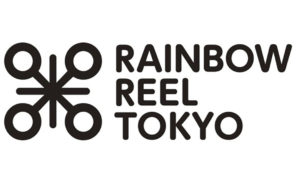
LGBTQ Festival Marks 25th Year
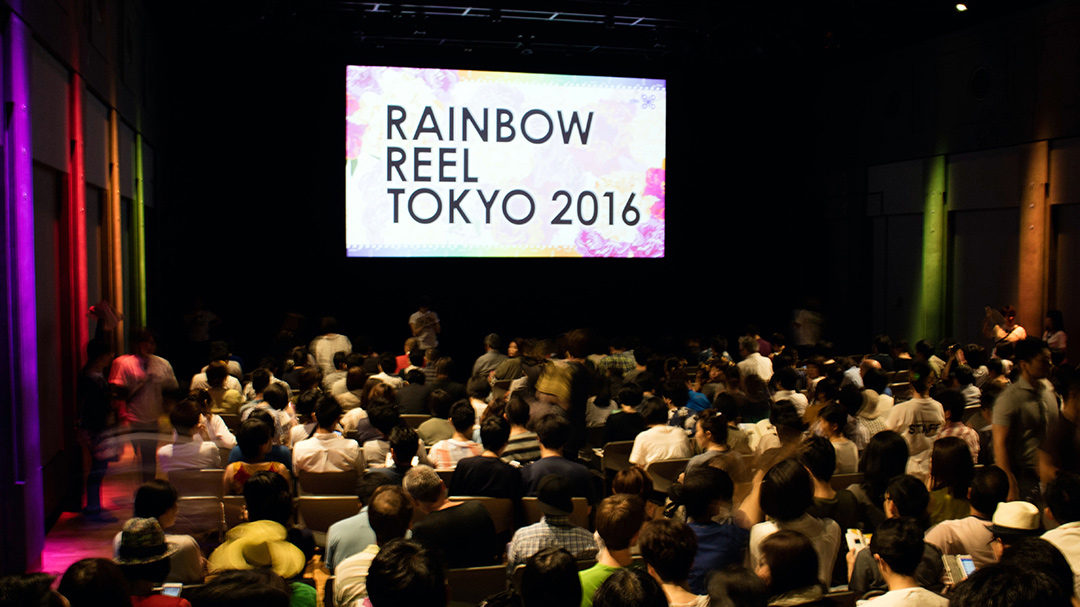 If ever there was a year to celebrate, this was it: Not only was the Tokyo International Lesbian & Gay Film Festival marking its 25th anniversary, it was also marking several landmarks in LGBTQ rights in Japan. In July 2015, just after the festival’s 24th iteration, Tokyo’s Setagaya Ward voted to follow Shibuya Ward’s lead in recognizing same-sex partnerships, which would allow hospital access to an ailing partner and discourage housing discrimination, and other municipalities across Japan then began considering similar moves.
If ever there was a year to celebrate, this was it: Not only was the Tokyo International Lesbian & Gay Film Festival marking its 25th anniversary, it was also marking several landmarks in LGBTQ rights in Japan. In July 2015, just after the festival’s 24th iteration, Tokyo’s Setagaya Ward voted to follow Shibuya Ward’s lead in recognizing same-sex partnerships, which would allow hospital access to an ailing partner and discourage housing discrimination, and other municipalities across Japan then began considering similar moves.
With the issue of gay rights constantly in the news, polls revealed that a majority of Japanese feel “society should support homosexuality,” while over 42% expressed support for same-sex unions. But these same-sex “marriages” are not yet legally binding, and despite a centuries-old history of adult adoption in Japan — which has proved convenient for legalizing a same-sex partnership in the modern era — it is still not possible for an LGBTQ couple to legally adopt children together.
So there’s still a long way to go, and that’s exactly why the newly dubbed Rainbow Reel Tokyo Film Festival continues to be among the standard bearers for gender fluidity, helping bring the community together, fostering discussion and debate, and educating and encouraging the vast number of Japanese who have yet to step out of the closet.
Running July 9 to 18 in Shinjuku as well as at its regular Omotesando home, Spiral Hall, Rainbow Reel Tokyo 2016 certainly “shared the diversity of sexuality through movies,” as per the organizers’ stated purpose. It also continued to be Japan’s friendliest film festival, with a welcoming atmosphere that included the selling of rainbow-colored gifts, the dissemination of instructional/promotional pamphlets and the periodic announcement that champagne is free for all (thanks to one of the many corporate sponsors).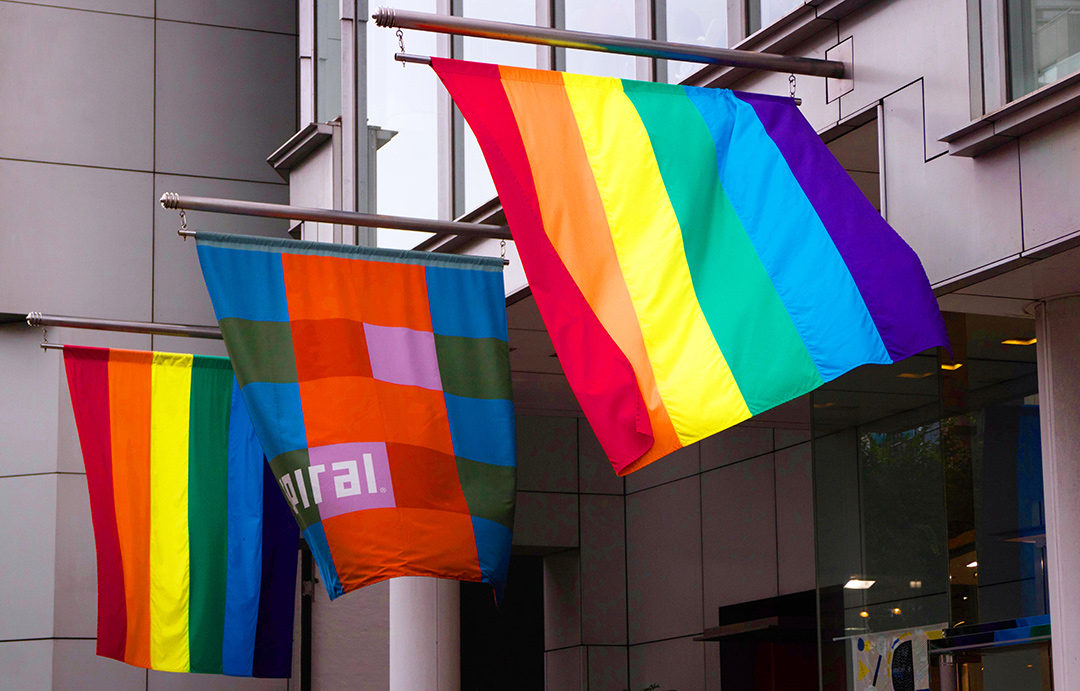 Rainbow Reel’s conviviality is partially due to the atmosphere of the Spiral Building itself, still a favorite destination of sophisticates of every age some 30 years after Fumihiko Maki first designed it. But the festival staff and several dozen volunteers always go out of their way to be inclusive, treating visitors like old friends and setting an unabashedly upbeat mood. There was even a volunteer who offered “casual interpreting” in English for the Q&A sessions that followed several of the screenings — a much-appreciated feature that more festivals in Japan should consider.
Rainbow Reel’s conviviality is partially due to the atmosphere of the Spiral Building itself, still a favorite destination of sophisticates of every age some 30 years after Fumihiko Maki first designed it. But the festival staff and several dozen volunteers always go out of their way to be inclusive, treating visitors like old friends and setting an unabashedly upbeat mood. There was even a volunteer who offered “casual interpreting” in English for the Q&A sessions that followed several of the screenings — a much-appreciated feature that more festivals in Japan should consider.
Among the films shown this year, all with English subtitles unless originally in English, there was the usual opportunity to see buzzed-about titles like the 2015 Berlinale Teddy Award winner, Paris 05:59, which begins with an audacious 18-minute orgy; the Japan premiere of Venice Golden Lion winner From Afar, the extraordinary first feature of Venezuelan Lorenzo Vigas, about the relationship between an older man and a street punk; the gentle Thai favorite How to Win at Checkers (Every Time), a coming-of-age story about two brothers who face conscription at different times; Summertime, a French lesbian love tale set against backdrop of the feminist movement, and the fantastical Girls Lost, about three schoolgirls who turn temporarily into boys. Another highlight was Peter Strickland’s gothic lesbian drama The Duke of Burgundy, and there were also revivals of two landmark films from Gregg Araki, The Living End and Mysterious Skin.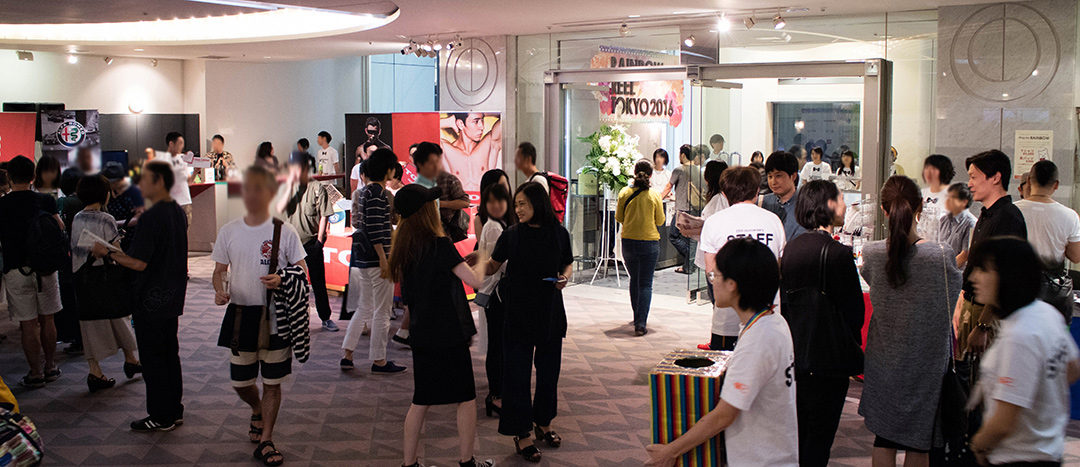 This year’s lineup included just two Japanese films, but they demonstrated how different and moving LGBTQ-themed films can be. Takuro Nakamura’s West North West, his sophomore feature, garnered impressive reviews on its premiere at the 2015 Busan International Film Festival, and will surely be heading into Japanese theaters soon. The poignant tale of an interracial almost-romance, the film focuses on three young women at odds with their lives and, at times, with each other. Iranian exchange student Naima (Rosa Sahel, who grew up in Japan and is completely bicultural) begins bonding with Kei (the always watchable Hanae Kan) in a café where both are trying to recover from disappointments — Naima from trouble at Immigration, Kei from another fight with her girlfriend, a fashion model.
This year’s lineup included just two Japanese films, but they demonstrated how different and moving LGBTQ-themed films can be. Takuro Nakamura’s West North West, his sophomore feature, garnered impressive reviews on its premiere at the 2015 Busan International Film Festival, and will surely be heading into Japanese theaters soon. The poignant tale of an interracial almost-romance, the film focuses on three young women at odds with their lives and, at times, with each other. Iranian exchange student Naima (Rosa Sahel, who grew up in Japan and is completely bicultural) begins bonding with Kei (the always watchable Hanae Kan) in a café where both are trying to recover from disappointments — Naima from trouble at Immigration, Kei from another fight with her girlfriend, a fashion model.

Soon, they are meeting frequently, tentatively becoming friends despite their vastly dissimilar upbringings. When Kei’s girlfriend Ai (a pouty but powerful Yuka Yamauchi) grows jealous, their tempestuous relationship comes to an end. Later, Kei’s attempted seduction of Naima results in another estrangement. Eventually, the three must overcome their fear and inability to trust one another in order to make some long-delayed decisions. Variety called West North West — the title a reference to the compass tattoo on Kei’s nape, and the strange magnetic field in her apartment — “an emotionally intricate pas de trois” and lauded the “piercingly restrained performances” of the actresses. At 126 minutes, however, its measured pace could test the patience of some audiences.
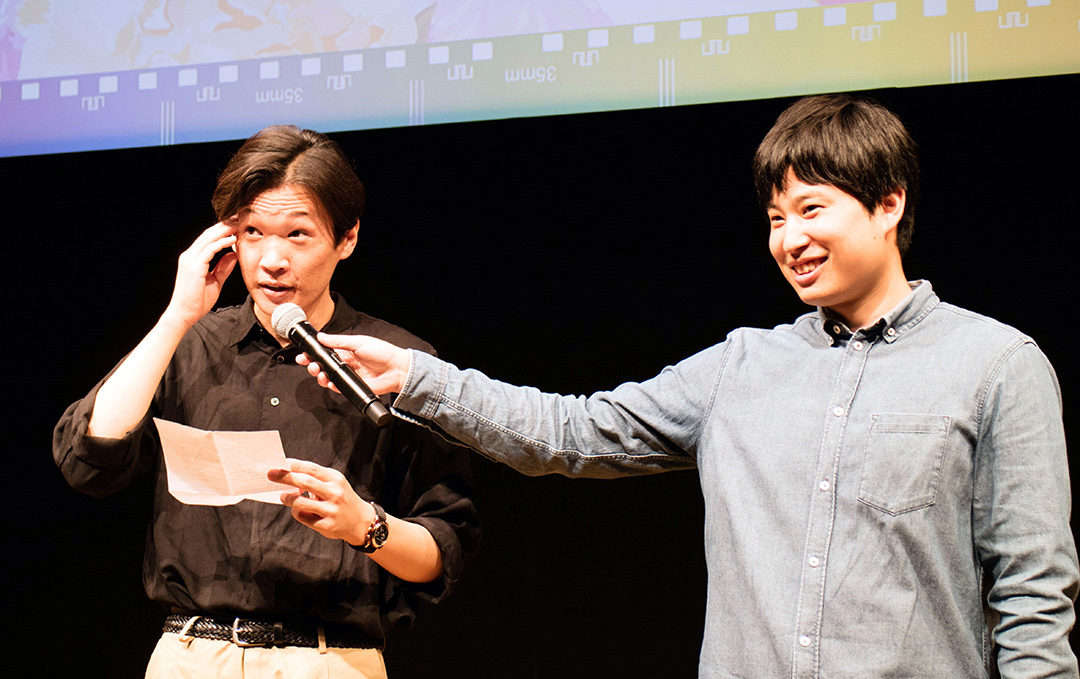
During the Q&A following the screening, the writer-director was asked what had inspired such an unusual story, his first LGBTQ work. Nakamura, with a great deal of hesitation, essentially admitted that the story was his own, that he’d felt utterly lost and lonely when he was 18 years old, until he’d met an Iranian man who had given him much peace of mind. “It’s very important to have love and peace,” he said. He left it for the audience to surmise whether or not this was his own coming-out moment.
The other Japanese film at Rainbow Reel was the world premiere of Yo Kohatsu’s mid-length documentary, High Heel Revolution!, about the “new hafu” star Natsuki Majikina, who recently signed with a leading talent agency. Spiral Hall was SRO for the screening, and the star’s appearance afterward was heavily covered by the media. Her enthusiasm is infectious, and it’s no surprise that specialty distributor Espace Sarou is releasing the film across Japan from September 17.

After an exhilarating first half hour, in which Majikina and her friends declare that they are “shemales” and revel in their nonconformist femininity, the documentary settles down into a series of self-reflections by Majikina, interviews with her family, friends, traumatizing teachers and liberating mentors, and surprisingly good dramatic reenactments of her “dark period” in junior high, as she attempted to reclaim her gender. [She’s played convincingly, and rather bravely, by teen star Tatsuomi Hamada.]
Although she is wont to throw out zingers like “I said goodbye to my balls in Nagoya” and “Shemales are selfish — we value individuality too much,” Majikina proves to be one very sensitive young lady. If it weren’t for the sheer strength and encouragement of her single mother, Noriko, she admits she never would have persisted in her early attempts to present as female. But Noriko told the principal that the junior high was violating her then-son’s civil rights, insisting it was clear he had gender identity disorder (largely unknown at the time), and from that moment on, Majikina was allowed to appear in skirts, if not to officially change her first name. High school friends remember her irrepressibly good spirits as being one reason she wasn’t mercilessly bullied; her exquisite beauty surely couldn’t have hurt, either. While older audiences can admire High Heel Revolution for Majikina’s pioneering outspokenness, the film is best aimed at young teens, who will benefit from its educational, inspirational approach, even if it reaches one too many warmhearted high notes. (There are also some rather disturbing scenes in which Majikina tries to be a good wife to her doting partner, doing the cooking and cleaning — talk about being trapped in a traditional sexual identity!)
High school friends remember her irrepressibly good spirits as being one reason she wasn’t mercilessly bullied; her exquisite beauty surely couldn’t have hurt, either. While older audiences can admire High Heel Revolution for Majikina’s pioneering outspokenness, the film is best aimed at young teens, who will benefit from its educational, inspirational approach, even if it reaches one too many warmhearted high notes. (There are also some rather disturbing scenes in which Majikina tries to be a good wife to her doting partner, doing the cooking and cleaning — talk about being trapped in a traditional sexual identity!)
Those who feel that Makijina’s struggle here would be of no interest outside Japan should think again. The US Justice Department and school districts across America have been embroiled in lawsuits supporting the efforts of transgender children to be allowed to be themselves, and the nationwide conversation on identity and discrimination has divided entire towns. Sweeping new guidelines were recently issued by the Oregon Department of Education, giving transgender students the right to use the bathrooms, locker rooms, names and pronouns they want, which is a start; but the heated legal debate continues.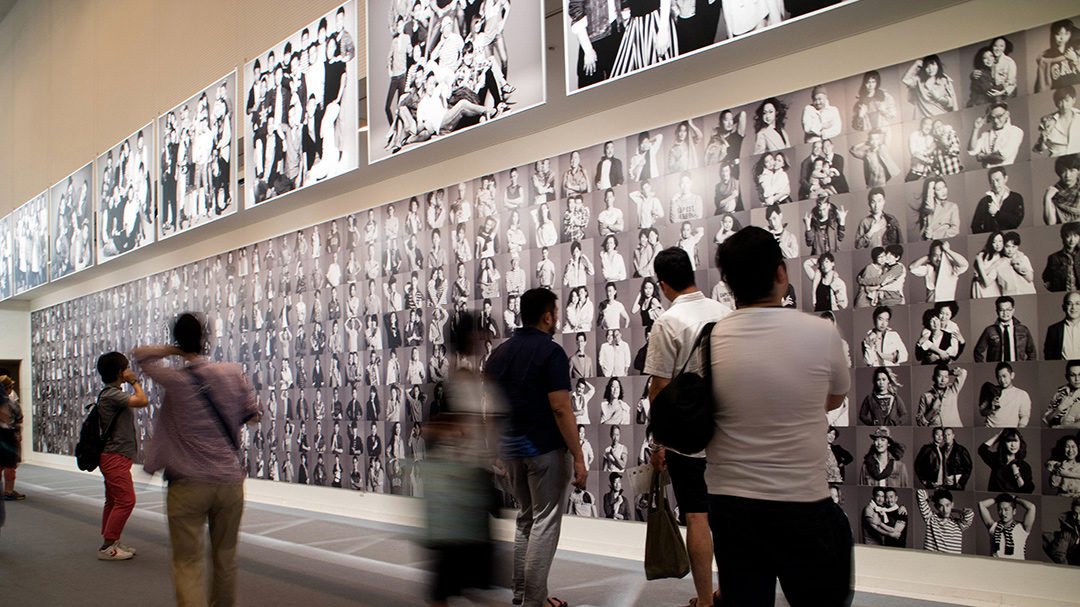 Along with the parties and films, another indelible highlight of Rainbow Reel’s 25th year was the exhibition of the epic and ever-expanding Out in Japan project, consisting of hundreds of portraits by renowned Singaporean photographer Leslie Kee. The openly gay Kee began shooting gorgeous black-and-white portraits of LGBTQ people in Japan — from teens to seniors, alone and in couples — with sponsorship from Gap in late 2015. Before the start of the Tokyo Olympics in 2020, the project will encompass 10,000 photos. During the festival’s run, the installation graced the walls of the lobby-level gallery, and cascaded up the two flights to Spiral Hall. It was impossible to stroll by without hearing people exclaiming in excitement that they’d found their own portrait, or those of friends.
Along with the parties and films, another indelible highlight of Rainbow Reel’s 25th year was the exhibition of the epic and ever-expanding Out in Japan project, consisting of hundreds of portraits by renowned Singaporean photographer Leslie Kee. The openly gay Kee began shooting gorgeous black-and-white portraits of LGBTQ people in Japan — from teens to seniors, alone and in couples — with sponsorship from Gap in late 2015. Before the start of the Tokyo Olympics in 2020, the project will encompass 10,000 photos. During the festival’s run, the installation graced the walls of the lobby-level gallery, and cascaded up the two flights to Spiral Hall. It was impossible to stroll by without hearing people exclaiming in excitement that they’d found their own portrait, or those of friends.
By the end of Out in Japan's 5-year project, one hopes it is no longer possible for those in denial to ignore the fact that Japan, too, has a sizable population of LGBTQ people. Here's hoping we see a far more inclusive and accepting society in 2020.
— KS
